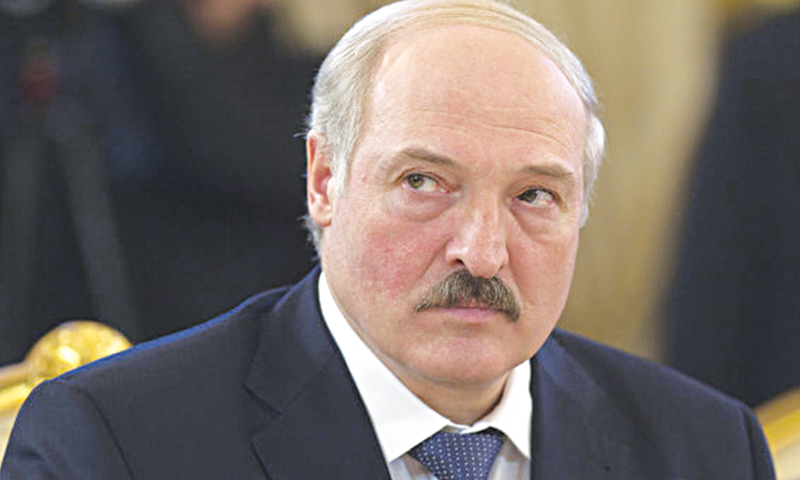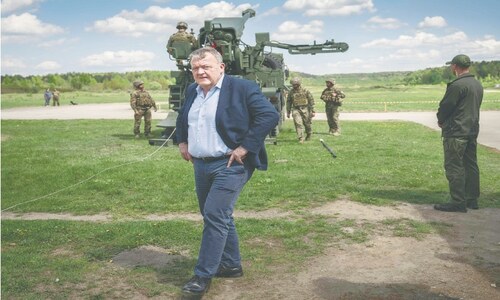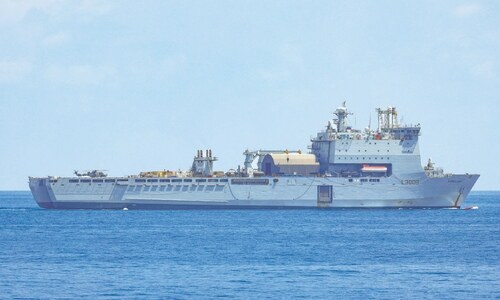MINSK: This summer, Belarus’s strongman stunned the small ex-Soviet nation by choosing for the first time in two decades to give a keynote speech not in Russian but in his own language.
In Belarus, bordering the European Union and former master Russia, Russian remains by far the most widely spoken language and the country’s distinctive Slavic tongue is often sidelined.
Sixty-year-old authoritarian leader Alexander Lukashenko himself once condemned Belarusian — seen as the preferred tongue of the beleaguered opposition — as a “poor language”.
Yet in recent months, the Belarusian strongman has been overseeing an explosion of patriotism as the country of 9.5 million seeks to distance itself from Russia amid the conflict in Ukraine — by embracing its national identity, language and culture.
Belarusians from all walks of life are going back to their roots by signing up for language courses, holding weddings in an ethnic style and donning national dress.
This celebration of national traditions is nothing short of a political act, said political analyst and historian Alexei Korol.
“By highlighting their national characteristics, people today are expressing their protest against Russian aggression and chauvinism,” he told AFP.
Belarus is following in the footsteps of pro-Western neighbour Ukraine where speaking Ukrainian and wearing traditional embroidered shirts have become symbols of resistance against Russia.
Embroidered shirts in vogue
In recent months Belarusians have also taken to wearing embroidered shirts known as “vyshyvanki” on the street, in night clubs and even in the boxing ring.
Seamstress Yulia Litvinova said the embroidered peasant blouses became all the rage after the crisis broke out in Ukraine.
“I have got orders for the next three months although before this craze, I embroidered just two shirts a month,” she told AFP.
Customised shirts with ethnic designs can sell between $200 and $700, a hefty amount in a country with an average monthly salary of roughly $500.
Those unwilling to splurge on hand embroidery snap up factory-made shirts or T-shirts featuring Belarusian folk designs or simply sew ribbons to their clothes.
One entrepreneurial Belarusian, Pavel Belavus, set up an internet store to tap into the rising demand for such T-shirts.
“Over the past two months, I have sold more than a thousand,” he said.
Earlier this month Belavus helped organise a fair for makers of ethnic attire.
The fair — advertised in state media — proved a major success, with thousands turning up.
“All of this should be preserved — the embroidery, clothes, the language,” said Alyona Khloptseva, one of those who attended. “We’ve inherited this from our forefathers.”
Yet this celebration of Belarusian identity could also be a huge challenge for Lukashenko who has sought to curb the use of the native language since taking power in 1994.
Many schoolteachers and university lecturers teaching in Belarusian have been dismissed.
“Over the past years authorities have tried to strangle the national identity of Belarusians,” said analyst Korol.“But cultural resistance has been gathering in the depths of Belarusian society all these years. The Ukrainian events have galvanised this resistance.”
Slowly, state policies are beginning to change.
Earlier this month Lukashenko said schoolchildren should study Belarusian for an extra hour per week, in addition to two hours now.
The president has also said that schools should pay more attention to the works of dissident Belarusian-language writer Vasil Bykov, best known for his World War II novels.
‘Ready to take up arms’
The Belarusian leader has conspicuously criticised Russia’s seizure of Crimea from Ukraine in March.
“This is a wrong approach,” he told Euronews this month, challenging Russia’s justification that the peninsula used to belong to Soviet Russia before 1954.
“Let’s then go back to the times of Khan Batyi, the times of the Mongol yoke. Then practically the entire territory of Russia, western Europe, Eastern Europe should be given to Kazakhstan, Mongolia or someone else.”
Ordinary Belarusians say they are ready to defend their homeland against a possible aggressor.
According to a recent poll from the Independent Institute of Socio-Economic and Political Studies based in EU member Lithuania, more than a quarter of Belarusians said they would take up arms if Russia tried to annex part of Belarusian territory.—AFP
Published in Dawn, October 23rd, 2014

















































Dear visitor, the comments section is undergoing an overhaul and will return soon.